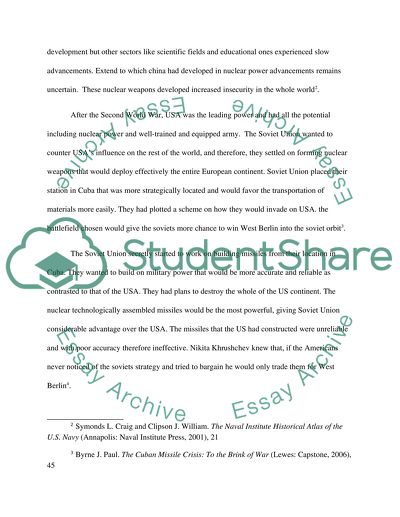Cite this document
(“The naval blockade established by the US during the Cuban missile Research Paper - 1”, n.d.)
The naval blockade established by the US during the Cuban missile Research Paper - 1. Retrieved from https://studentshare.org/military/1606555-the-naval-blockade-established-by-the-us-during-the-cuban-missile-crisis-was-the-most-effective-strategy-that-forced-the-soviet-union-to-remove-the-missiles-from-cuba
The naval blockade established by the US during the Cuban missile Research Paper - 1. Retrieved from https://studentshare.org/military/1606555-the-naval-blockade-established-by-the-us-during-the-cuban-missile-crisis-was-the-most-effective-strategy-that-forced-the-soviet-union-to-remove-the-missiles-from-cuba
(The Naval Blockade Established by the US During the Cuban Missile Research Paper - 1)
The Naval Blockade Established by the US During the Cuban Missile Research Paper - 1. https://studentshare.org/military/1606555-the-naval-blockade-established-by-the-us-during-the-cuban-missile-crisis-was-the-most-effective-strategy-that-forced-the-soviet-union-to-remove-the-missiles-from-cuba.
The Naval Blockade Established by the US During the Cuban Missile Research Paper - 1. https://studentshare.org/military/1606555-the-naval-blockade-established-by-the-us-during-the-cuban-missile-crisis-was-the-most-effective-strategy-that-forced-the-soviet-union-to-remove-the-missiles-from-cuba.
“The Naval Blockade Established by the US During the Cuban Missile Research Paper - 1”, n.d. https://studentshare.org/military/1606555-the-naval-blockade-established-by-the-us-during-the-cuban-missile-crisis-was-the-most-effective-strategy-that-forced-the-soviet-union-to-remove-the-missiles-from-cuba.


